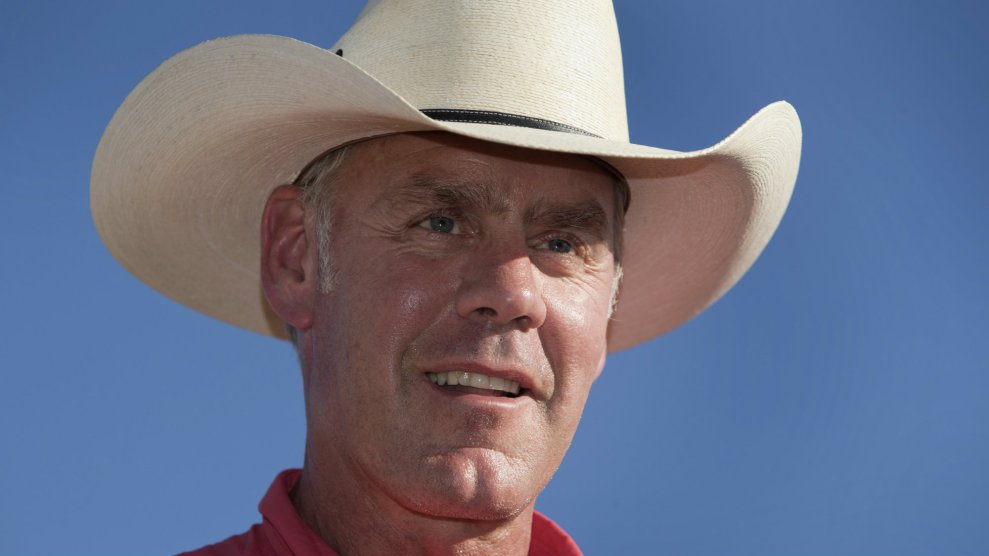
Charles Koch, chief executive officer of Koch Industries, is shown at The Broadmoor Resort in Colorado Springs, Colo.David Zalubowski/AP
This story was originally published by the Guardian and is reproduced here as part of the Climate Desk collaboration.
An alliance of rightwing groups has crafted an extensive presidential proposal to bolster the planet-heating oil and gas industry and hamstring the energy transition, it has emerged.
Against a backdrop of record-breaking heat and floods this year, the $22 million endeavor, Project 2025, was convened by the notorious rightwing, climate-denying think tank the Heritage Foundation, which has ties to fossil fuel billionaire Charles Koch.
Called the “Mandate for Leadership: The Conservative Promise,” it is meant to guide the first 180 days of presidency for an incoming Republican president. Climate experts and advocates criticized planning that would dismantle US climate policy.
The nearly 1,000-page transition guide was written by more than 350 right-wingers and is full of sweeping recommendations to deconstruct all sectors of the federal government—including environmental policy. “Heritage is convening the conservative movement behind the policies to ensure that the next president has the right policy and personnel necessary to dismantle the administrative state and restore self-governance to the American people,” the foundation’s president, Kevin Roberts, said in an April statement.
The guide’s chapter on the Department of Energy proposes eliminating three agency offices that are crucial for the energy transition, and also calls to slash funding to the agency’s grid deployment office in an effort to stymie renewable energy deployment, E&E News reported this week.
The plan, which would hugely expand gas infrastructure, was authored by Bernard McNamee, a former official at the agency. McNamee was also a Donald Trump appointee to the Federal Energy Regulatory Commission. He previously led the far-right Texas Public Policy Foundation, which fights environmental regulation, and served as a senior adviser to the Republican senator Ted Cruz.
Another chapter focuses on gutting the Environmental Protection Agency and moving it away from its focus on the climate crisis. It proposes cutting the agency’s environmental justice and public engagement functions, while shrinking it as a whole by terminating new hires in “low-value programs,” E&E News reported. The proposal was written Mandy Gunasekara, who was the former chief of staff at the EPA under Trump.
The guide also features a chapter on the Department of the Interior written by William Perry Pendley, who controversially led the Bureau of Land Management under President Trump and worked to eliminate drilling regulations.
Before his time in the Trump administration, Pendley headed the Mountain States Legal Foundation, a conservative law firm, where he advocated for selling off public lands. He also authored a book, Sagebrush Rebel, praising Reagan’s anti-regulatory policies.
“He did a bunch of terrible things,” said Kert Davies, director of special investigations at the Center for Climate Integrity, about Pendley’s time at the Department of the Interior. “He worked to dismantle [the Bureau of Land Management] while he was in it.”
The Heritage Foundation has enjoyed a longstanding influence in GOP politics, even helping Ronald Reagan win the presidency, authors Naomi Oreskes and Erik M Conway detail in their 2023 book, The Big Myth. Many of Reagan’s policy proposals were cribbed from the pages of the think-tank’s first Mandate for Leadership, published in 1980, which asserted that the US was in the middle of a “crisis of overregulation.”
“It doesn’t trouble me that any individual or institution would develop advisory plans for politicians. What troubles me is the Heritage Foundation’s long history…of working to undermine environmental protection at the expense of health and wellbeing of the American people, at the expense of life on Earth,” said Oreskes, a history of science professor at Harvard.
Meanwhile, House GOP members are also continuing to attack federal climate funding in their spending bill proposals, putting governmental functions at risk.
Earlier this month, the Clean Budget Coalition—composed of more than 250 advocacy groups—that Republican representatives were slipping restrictions on climate spending into the government’s annual spending bills, bills that must be passed before current funding expires on September 30 to avoid a government shutdown. This week, the coalition found that House Republicans had added additional “poison pills” to spending bills, including ones that target environmental funding.
The spending bills are currently in the House appropriations committee, which is chaired by Texas Republican Kay Granger, a top recipient of campaign funding from the oil and gas industry, the Lever reported this week. They will go to a full vote in the House, and then the finalized proposals will move into negotiations with the Senate. If Biden vetoes them, a government shutdown could be on the way.
“Republicans in Congress continue to show they will stop at nothing to undermine environmental protections and attack anything that would help addressing the climate crisis,” said David Shadburn, a senior government affairs advocate at the League of Conservation Voters.
Some of the provisions would hamstring the EPA’s powers, blocking the agency from enforcing new pollution limits on power plants and tailpipe emissions or from implementing controls on mercury and other toxic air pollution, and effectively shuttering a critical program for deploying carbon-free energy.
“House appropriations Republicans are abusing the appropriations process to impose a cycle of environmental injustice,” said Deanna Noël, climate campaigns director for the consumer advocacy nonprofit Public Citizen.
Other “poison pills” would prohibit listing the dunes sagebrush lizard under the Endangered Species Act, remove protections for the greater Yellowstone ecosystem’s population of grizzly bears, and bar the Department of the Interior from creating a working group to help restore bison populations. Still others would require the energy secretary to sell 1 million barrels of refined petroleum from the Strategic Petroleum Reserve, and block the implementation of a rule forcing federal defense contractors to disclose their greenhouse gas emissions and create emission reductions plans.
Every GOP representative can submit proposals to the House appropriations committee, and since no member is required to sign off on specific proposals, it is not clear who exactly is responsible for each “poison pill.” But as the Lever reported, many Republican representatives who have effectively championed the provisions are recipients of funding from polluting industries.
For instance, a proposal to halt climate-related fisheries research funding was written by a subcommittee led by Rep. Hal Rogers of Kentucky, whose top campaign contributors include mining and fossil fuel interests. Another proposal would bar funding for the UN’s Green Climate Fund; it was buried in a bill being overseen by major energy funding recipient Rep. Mario Díaz-Balart of Florida, the Lever reported.
“These disgraceful poison pill riders are nothing short of corporate giveaways to the corrupt fossil fuel industry,” said Noël.
The proposals come as waters off the Florida coast reach levels of heat more commonly found in hot tubs, and as much of the nation continues to swelter under triple-digit temperatures.












